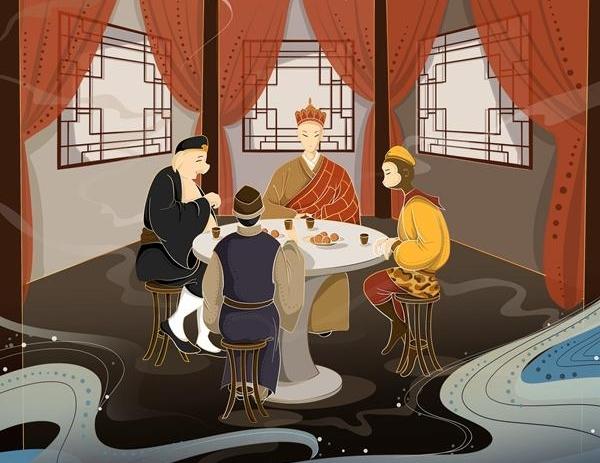唐僧师徒喝的“素酒”是什么酒?
作者:王晓辉
《西游记》第十二回,玄奘从长安出发,前往西天取经。唐太宗李世民在城关外亲自为玄奘举酒送行:
玄奘又谢恩,接了御酒道:“陛下,酒乃僧家头一戒,贫僧自为人,不会饮酒。”太宗道:“今日之行,比他事不同。此乃素酒,只饮此一杯,以尽朕奉饯之意。”三藏不敢不受。接了酒,……复谢恩饮尽,辞谢出关而去。
唐太宗捧给玄奘的是一杯“素酒”,素酒是什么酒?酒是由粮食或者水果酿造的,当然是素的,难道还有用肘子或者鸡腿酿的酒吗?
我们先来看看两位翻译家是怎样理解这段话的。
余国藩教授的译文:
Thanking him, Xuanzang accepted the wine and said, "Your Majesty, wine is the first prohibition of priesthood. Your poor monk has practiced abstinence since birth." "Today's journey," said Taizong, "is not to be compared with any ordinary event. Please drink one cup of this dietary wine, and accept our good wishes that go along with the toast." Xuanzang dared not refuse; he took the wine and ... thanked the emperor once more and drained the cup.
詹纳尔教授的译文:
Thanking the Emperor for his kindness, he accepted the cup of wine with the words, "Your Majesty, liquor is the first of the things from which a monk must abstain, and so I have never drunk it." "Today's journey is exceptional," Taizong replied, "and besides, this is a nonalcoholic wine, so you should drink this cup and let us feel that we have seen you off properly." Unable to refuse any longer, Sanzang took the wine ... and thanking the Emperor once more he drained the cup ...
从上面的译文看,两位译者都注意到了“素酒”的含义,只是表达方式有差异。余国藩教授用dietary wine来翻译素酒,dietary是diet的形容词形式,指为健康等目的特别设计的饮食,如diet coke(无糖可乐)和diet drinks(低热量饮料)。dietary wine在这里可以理解为专为斋戒的人准备的低度酒或不含酒精的饮料。詹纳尔教授将“素酒”直接翻译成nonalcoholic wine(不含酒精的饮料),简洁明了,更易于外国读者接受。
那么,素酒到底是什么酒?出家人究竟能不能喝酒呢?
素酒一般指没有经过蒸馏的低度酒,米酒、水果酿制的酒均属于素酒一类。素酒又叫小酒,《宋史·食货志》里提到:“自春至秋,酝成即鬻,谓之小酒……腊酿蒸鬻,候夏而出,谓之大酒”。我不是酿酒的行家,仅能从字面上理解个大概。不过,出家人对于粮食酿制的酒还是比较介意的。古代社会生产力低下,填饱肚子已经非常不易,用粮食来酿酒则是一件十分奢侈的事情,在佛家看来,属于糟蹋粮食,夺人口粮,甚至是间接杀生。所以,《西游记》中唐僧师徒喝的素酒极有可能是水果酿制的低度酒。这一点,我们从小说的描述中也能找到一些佐证。
《西游记》第八十二回,金鼻白毛老鼠精将唐僧捉住,要与这位和尚哥哥成亲:
那妖精露尖尖之玉指,捧晃晃之金杯,满斟美酒,递与唐僧,口里叫道:“长老哥哥妙人,请一杯交欢酒儿。”三藏羞答答的接了酒,望空浇奠,心中暗祝道:“护法诸天、五方揭谛、四值功曹:弟子陈玄奘,自离东土,蒙观世音菩萨差遣列位众神暗中保护,拜雷音见佛求经,今在途中,被妖精拿住,强逼成亲,将这一杯酒递与我吃。此酒果是素酒,弟子勉强吃了,还得见佛成功;若是荤酒,破了弟子之戒,永堕轮回之苦!”孙大圣,他却变得轻巧,在耳根后,若像一个耳报,但他说话,惟三藏听见,别人不闻。他知师父平日好吃葡萄做的素酒,教吃他一锺。
从上面唐僧的心理独白我们知道,如果是素酒,勉强吃了,还不算罪过;如果是荤酒(高度酒),就算是破戒,那麻烦就大了。另外,孙悟空还向我们透露了一个重要信息,那就是唐僧平时还是喜欢喝一点小酒的,当然是葡萄做的素酒。
为什么出家人可以喝一点低度酒呢?原来,戒也是有区别的。在佛门五戒中,饮酒戒是唯一的“遮戒”。遮,制止之意,是对轻罪的禁戒。《佛教汉英词典》中“遮戒”的翻译是secondary commandment / secondary rule。其它如杀、盗、淫、妄等戒,均属“性戒”(commandment based on the primary laws of human nature),即当初无论佛陀是否制戒,原本就应当持守之戒。喝酒本身不是问题,喝大了才是问题,容易让人偏离正道,犯杀、盗、淫、妄等“性戒”。所以,饮酒戒关注的不是喝不喝,而是喝什么、喝多少。唐僧师徒虽然出家持戒,但也不是活在真空当中,还要同皇帝、官府、百姓,甚至妖精打交道,一些特殊的场合,还是要应酬的,如唐太宗送行的素酒,唐僧能不给面子吗?

【配图:彭靖雯】
《西游记》小说中,唐僧几次饮酒,控制得都很好,能推辞尽量推辞,实在推不开,只饮一杯,更多情况下是让徒弟代饮。当然,悟空、八戒和沙僧还是很愿意承担这项任务的。小说第十九回有一段关于师徒在高老庄参加答谢宴会的描写,非常有意思:
高老把素酒开樽,满斟一杯,奠了天地,然后奉与三藏。三藏道:“不瞒太公说,贫僧是胎里素,自幼儿不吃荤。”老高道:“因知老师清素,不曾敢动荤。此酒也是素的,请一杯不妨。”三藏道:“也不敢用酒。酒是我僧家第一戒者。”悟能慌了道:“师父,我自持斋,却不曾断酒。”悟空道:“老孙虽量窄,吃不上坛把,却也不曾断酒。”三藏道:“既如此,你兄弟们吃些素酒也罢。只是不许醉饮误事。” 遂而他两个接了头锺。各人俱照旧坐下,摆下素斋。说不尽那杯盘之盛,品物之丰。
从这一段描写我们可以看出,僧人的饮酒戒是相对宽松的,至少小说里是这样。悟空和八戒从来就没有断过酒,而且唐僧也允许他们吃些素酒。另外,唐僧叮嘱徒弟不要“醉饮误事”,说明素酒不是不含酒精的饮料,而是有一定度数的。
詹纳尔教授的译文:
Squire Gao opened a pot of wine, from which he filled a cup and poured a libation to Heaven and Earth before handing it to Sanzang. "Frankly, sir," Sanzang said, "I have been a vegetarian from the womb, and have not consumed strong-flavoured food since my earliest childhood."
"Venerable master, I know that you are a vegetarian," Squire Gao replied, "which is why I haven't pressed any meat or strong-flavoured food upon you. But this wine is made from vegetable matter, so a cup of it will do no harm." "I don't drink either," Sanzang explained, "as alcohol is the first of the prohibitions of the priesthood." "Master," Pig hastily interjected, "I may be a vegetarian, but I haven't given up liquor." "And although I haven't strong head for the stuff and can't finish a whole jar of it, I haven't given it up either," Monkey added. "In that case you two had better drink some; but don't get drunk and ruin everything," said Sanzang. The pair of them then took the first cup, after which everyone sat down again as the vegetarian dishes were brought in. Words could not describe the flowing cups, the well-filled dishes, and the splendid food.
高老庄的庄主是乡绅,书中称其为高老;悟空没大没小,管人家叫老高。高老与老高,一颠一倒,相差不少,詹纳尔教授的翻译是Squire Gao(高老)和Gao, old chap(老高)。余国藩教授将高老译成old Mr. Gao,显得很现代很西洋。“胎里素”,being vegetarian from birth或者being vegetarian from the womb均可。出家人所说的“荤”的概念,并不单纯指肉食,还包括葱、蒜等有刺激味道的蔬菜,翻译成英文就是meat and strong-flavoured food。最后一句话,“说不尽那杯盘之盛,品物之丰”,是汉语文学作品中常见的表达方式,但要想恰如其分地译成英文并不容易。余国藩教授的译文:We cannot tell you in full what a richly laden table that was, and what varieties of delicacies were presented. 詹纳尔教授的译文:Words could not describe the flowing cups, the well-filled dishes, and the splendid food. 两位译者的翻译,一个周密细致,一个简单明了,都值得我们学习参考。
一杯素酒,竟然引出这么多话来。中国文化,历史悠久,博大精深,许多词汇都有其独特的内涵。如果不了解中文词汇的含义及其背后的文化背景,怎么能准确地翻译给外国读者呢?即便勉力为之,也会出漏洞,经不住推敲。
 0
0 







Go to Forum >>0 Comment(s)